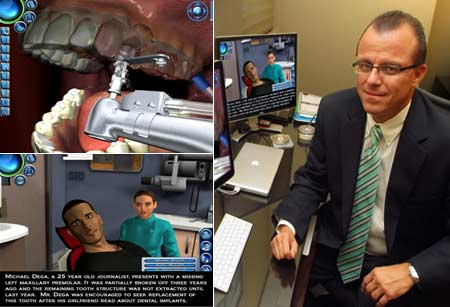
Technology has sure left everyone spellbound with its numerous possibilities and benefits. Now a way of using a combination of two modern technologies to further enhance its effects has been developed.
A realistic computer game is believed to globally aid dental students to learn and reinforce dental implant procedures. This Virtual Dental Implant Training Simulation Program, designed by Medical College of Georgia School of Dentistry faculty and students and BreakAway, Ltd. is believed to help dental students in decision making, diagnostics and treatment protocols. BreakAway is stated to be a developer of game-based technology for experimentation, training and also decision-making analysis.
Dental implants, the little screws placed surgically in the jaw, are believed to play the role of artificial roots for prosthetic teeth. Evidently, previous examination was said to have revealed that health care providers practicing clinical skills through simulation seem to have an improved patient outcome as compared to those who didn’t.
Dr. Roman Cibirka, vice president for instruction and enrollment management, MCG; and also the program’s project director, says that, “There’s a lot of enthusiasm in the global dental and medical communities to use virtual reality and simulation as a tool to convey and reinforce information and ensure competency levels.â€
Dr. Cibirka further states that, “The program was an opportunity to align the defined need to enhance the depth and penetration of implant therapy knowledge in undergraduate dental education with my vision of using gaming to reach the millennial student.â€
This particular game is believed to incorporate numerous patients and clinical scenes which could possibly be used randomly. This may in turn permit the students to interact with the virtual patients and examine and diagnose them accordingly. The virtual patients are stated to be akin to human beings with different personalities, therefore the students are required to customize treatments based on the individual needs of each patient.
If a patient requires implant therapy then the scene shifts to a virtual clinical treatment area. Here the students are evidently the judge of the location, type and orientation of the implants, the type and location of anesthesia, and even the tools used for surgery.
Dr. Cibirka exclaims that, “It’s realistic. If the student doesn’t place anesthesia in the right spot, the patient screams.â€
Having pointed out the benefits of this game, it was also stated that this game aims to supplement and not substitute actual clinical training. This game is meant to provide education to the students at anytime, anywhere.
This game was believed to have been presented at the fifth annual Games for Health Conference, Boston.
